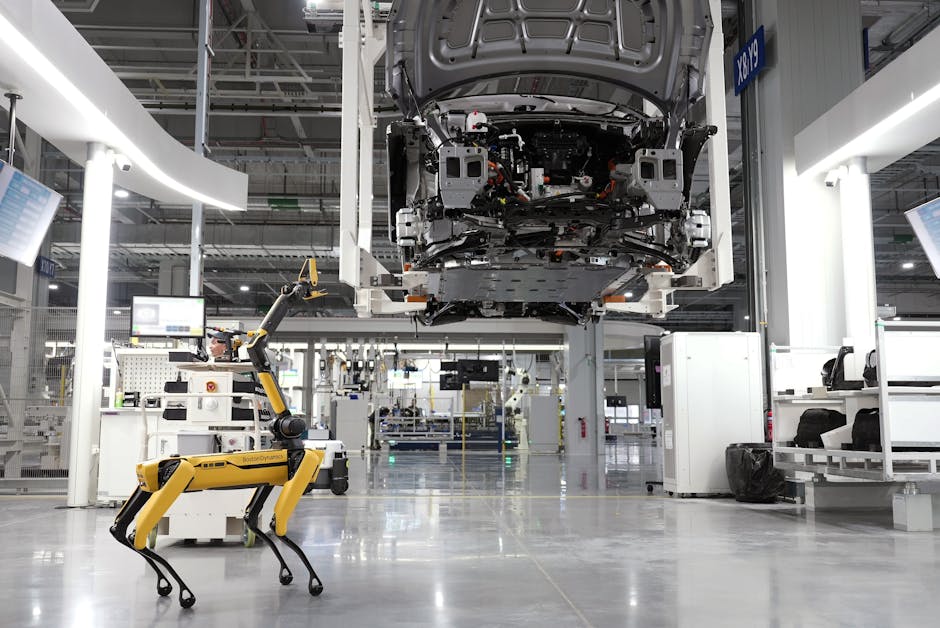The Impact of AI on Industries
In today’s rapidly evolving technological landscape, artificial intelligence (AI) has emerged as a transformative force across various industries. From healthcare to finance, manufacturing to retail, AI is reshaping the way businesses operate, innovate, and adapt to the digital age. The integration of AI technologies has led to unprecedented advancements, efficiency gains, and new opportunities for growth. In this article, we will delve into the profound impact of AI on industries, exploring its applications, benefits, challenges, and future implications.
1. Revolutionizing Customer Service

One of the most significant impacts of AI on industries is its role in revolutionizing customer service. AI-powered chatbots and virtual assistants have become increasingly prevalent in sectors such as e-commerce, telecommunications, and hospitality. These intelligent systems can interact with customers in real-time, addressing inquiries, providing personalized recommendations, and even processing orders. By leveraging natural language processing (NLP) and machine learning algorithms, AI chatbots can simulate human-like conversations and offer round-the-clock support, enhancing customer satisfaction and loyalty.
For example, companies like Amazon and Apple have integrated AI assistants like Alexa and Siri into their products, allowing users to perform tasks, get information, and control smart devices through voice commands. These AI-driven solutions not only streamline customer interactions but also enable companies to gather valuable insights into consumer behavior, preferences, and trends. By analyzing data from customer interactions, businesses can optimize their products, services, and marketing strategies, driving revenue growth and competitive advantage.
2. Enhancing Operational Efficiency

AI technologies are also revolutionizing operational processes across industries, enabling organizations to streamline workflows, automate tasks, and improve overall efficiency. Machine learning algorithms can analyze vast amounts of data to identify patterns, predict outcomes, and optimize resource allocation. In manufacturing, AI-driven predictive maintenance systems can anticipate equipment failures and schedule repairs proactively, minimizing downtime and reducing maintenance costs.
Moreover, AI-powered robotic process automation (RPA) is transforming back-office operations by automating repetitive tasks, such as data entry, invoice processing, and report generation. By offloading routine activities to intelligent machines, employees can focus on more strategic, value-added tasks that require human creativity and decision-making. This shift towards automation not only increases productivity but also enhances job satisfaction and employee engagement.
3. Driving Innovation and Product Development

AI is driving innovation and accelerating product development cycles in industries ranging from healthcare to automotive. By leveraging AI algorithms for data analysis, pattern recognition, and simulation, companies can expedite the research and development (R&D) process, bringing new products and services to market faster. In healthcare, AI-powered diagnostic tools can analyze medical images, detect anomalies, and assist healthcare professionals in making accurate diagnoses.
Furthermore, AI is enabling the creation of personalized products and services tailored to individual preferences and needs. E-commerce platforms are using AI algorithms to recommend products based on customer browsing history, purchase behavior, and demographic information. This level of personalization not only enhances the customer experience but also drives sales and customer loyalty. As AI continues to advance, we can expect to see more innovative products and services that cater to diverse consumer demands.
4. Transforming Supply Chain Management

AI is transforming supply chain management by optimizing inventory management, logistics, and demand forecasting. By analyzing historical data, market trends, and external factors, AI algorithms can predict consumer demand, identify cost-saving opportunities, and mitigate supply chain risks. In retail, AI-powered demand forecasting systems can help companies anticipate fluctuations in demand, optimize inventory levels, and reduce stockouts and overstock situations.
Moreover, AI technologies are enhancing visibility and transparency across the supply chain, enabling companies to track products in real-time, monitor shipments, and ensure compliance with regulatory requirements. Blockchain technology, combined with AI, is revolutionizing supply chain traceability by creating a decentralized, secure ledger that records the movement of goods from manufacturing to delivery. This level of transparency not only improves operational efficiency but also builds trust among consumers and stakeholders.
5. Revolutionizing Financial Services
The financial services industry has been significantly impacted by AI, with applications ranging from fraud detection and risk management to customer insights and portfolio optimization. AI algorithms can analyze vast amounts of financial data in real-time, identifying suspicious activities, patterns, and anomalies that may indicate fraudulent behavior. By leveraging machine learning models, financial institutions can enhance security measures, minimize risks, and protect customer assets.
Furthermore, AI-powered robo-advisors are revolutionizing the way individuals manage their investments, offering personalized financial advice, portfolio rebalancing, and risk assessment. These digital wealth management platforms use algorithms to analyze market trends, assess risk profiles, and recommend investment strategies tailored to each client’s financial goals and preferences. By democratizing access to financial advice and investment opportunities, AI is reshaping the wealth management landscape and empowering individuals to make informed decisions about their finances.
6. Addressing Ethical and Regulatory Challenges
As AI technologies continue to proliferate across industries, they raise ethical and regulatory challenges that must be addressed to ensure responsible deployment and usage. Concerns about data privacy, algorithmic bias, and job displacement have prompted policymakers, industry leaders, and researchers to develop guidelines and frameworks for AI governance. Organizations must prioritize transparency, accountability, and fairness in their AI systems to maintain trust and mitigate potential risks.
Moreover, the ethical implications of AI in industries such as healthcare, criminal justice, and autonomous vehicles require careful consideration and ongoing dialogue among stakeholders. Questions around algorithmic accountability, data protection, and human oversight are central to the ethical development and deployment of AI technologies. By fostering collaboration and ethical reflection, we can harness the potential of AI to drive positive outcomes and societal benefits while minimizing unintended consequences.
7. Shaping the Future of Work
The impact of AI on industries extends to the workforce, with implications for job roles, skills development, and career pathways. As automation technologies become more prevalent, certain tasks and roles may be automated, leading to concerns about job displacement and the future of work. However, AI also creates new opportunities for upskilling, reskilling, and pursuing careers in emerging fields such as data science, AI engineering, and cybersecurity.
Organizations and educational institutions must collaborate to equip individuals with the skills and competencies needed to thrive in an AI-driven economy. Lifelong learning, adaptability, and creativity are essential qualities for navigating the changing labor market and embracing the opportunities presented by AI technologies. By fostering a culture of continuous learning and innovation, we can prepare the workforce for the challenges and possibilities of the digital age.
Common Misconceptions
Despite the numerous benefits of AI on industries, there are common misconceptions that persist about the technology. One of the prevalent myths is that AI will replace human workers entirely, leading to mass unemployment. In reality, AI is more likely to augment human capabilities, automate routine tasks, and create new job opportunities in emerging fields.
Another misconception is that AI algorithms are infallible and unbiased. In reality, AI systems can inherit biases from the data they are trained on, leading to discriminatory outcomes. It is essential for organizations to implement measures to mitigate bias, ensure fairness, and promote diversity in AI development and deployment.
Conclusion
In conclusion, the impact of AI on industries is profound and multifaceted, reshaping business operations, customer interactions, and workforce dynamics. From revolutionizing customer service to enhancing operational efficiency, AI technologies are driving innovation, productivity, and competitiveness across various sectors. As organizations navigate the opportunities and challenges presented by AI, it is crucial to prioritize ethical considerations, regulatory compliance, and skills development to harness the full potential of AI for positive outcomes.
As we look towards the future, the continued advancement of AI will undoubtedly transform industries, economies, and societies in unprecedented ways. By embracing a human-centric approach to AI adoption and fostering collaboration among stakeholders, we can leverage the power of AI to create a more inclusive, sustainable, and prosperous future for all.




